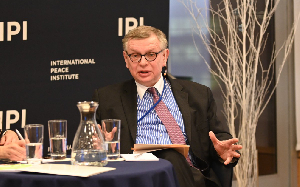The International Cocoa Initiative (ICI) has reached 188,000 children with child protection measures half-way through its six-year strategy which is targeting to reach 200,000 children by end of 2020.
A statement from the initiative and copied to the Ghana News Agency noted that the operational impact of ICI’s work from 2015 to 2017 had therefore been far greater than anticipated.
The statement said despite the effort by the initiative, many more vulnerable children and child labourers remained unassisted in West African cocoa-growing areas.
The statement, therefore, called for the urgent need for innovation, adaptation and capacity-building to bring the good practices adopted by ICI, its members and its partners to a larger scale.
It said that by the end of 2017, ICI’s Child Labour Monitoring and Remediation System (CLMRS), implemented with six partner companies, targeted 127 cooperatives and 90,826 cocoa-farming households.
“Through 2017, ICI continued its support to 75 cocoa-farming communities in Côte d’Ivoire and Ghana, through its core programme. 127,299 people benefitted from community development, 63,886 of whom were children,” the statement noted.
The statement said newly built classrooms, vocational training courses, and the establishment of women’s income-generating activities all contributed to improved prospects for children, as 3,949 children were newly enrolled in school between 2016 and 2017 as a direct result of ICI’s actions in the communities.
The statement said ICI planned to use the data it had generated over the last three years to learn, innovate and adapt its approaches so as to facilitate and accelerate their scale-up.
“If we test, prove and apply these theories not only to our own fieldwork but also to our dialogue and collaboration with other actors in the cocoa sector, including the national governments, we can expect to see even more progress over the coming years” Nick Weatherill, the Executive Director ICI said.
ICI launched its Annual Report on June 12, highlighting its key achievements in child protection and role as a driver of learning and capacity-building in the cocoa supply-chain to address its most complex sustainability.
This was part of the commemoration of the World Day against Child Labour.
Business News of Sunday, 17 June 2018
Source: ghananewsagency.org













